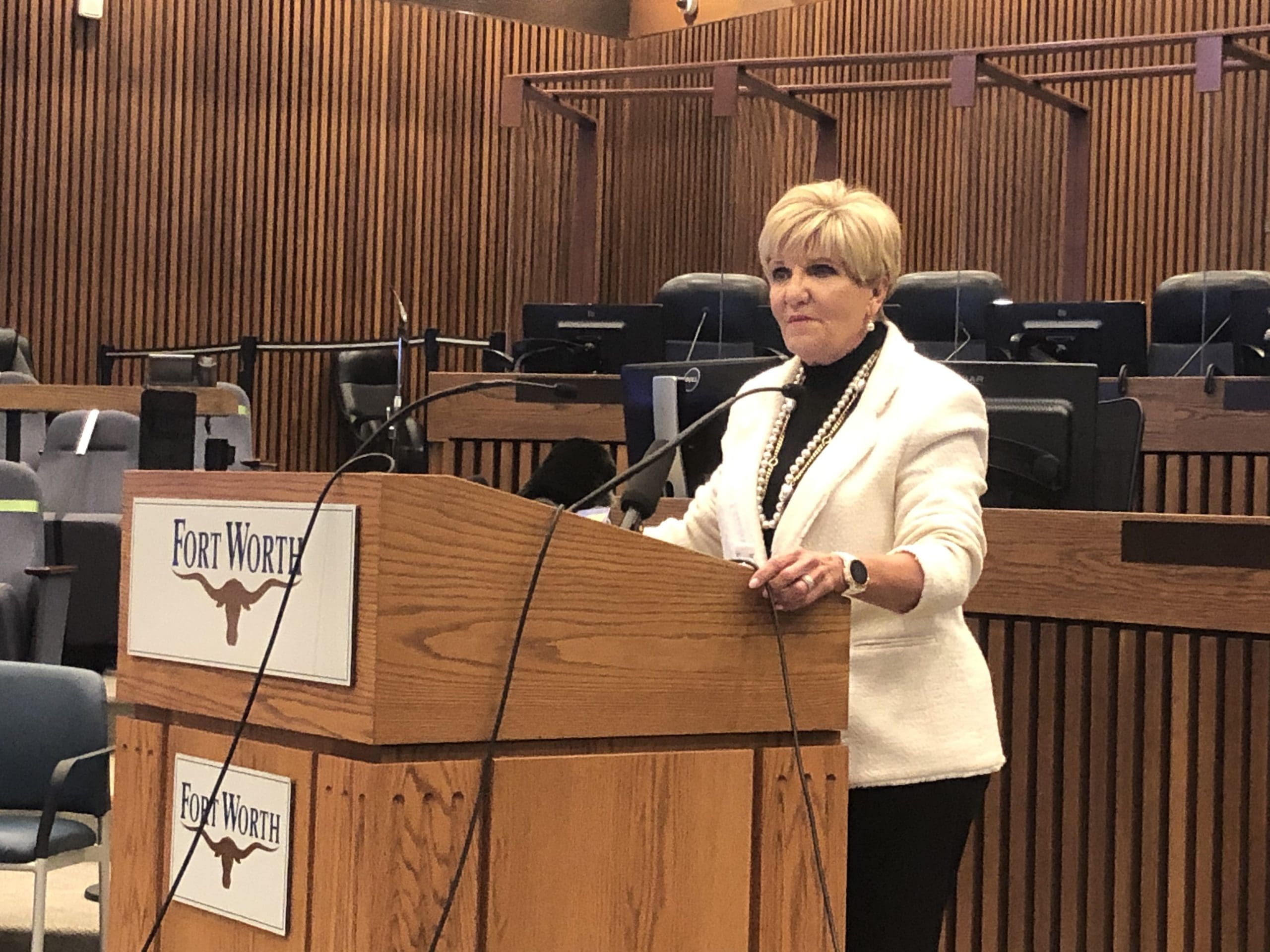With Fort Worth Mayor Betsy Price—whose record includes more debt and higher taxes—announcing she will not run for re-election, citizens may face a choice between the city establishment or the left, unless a new mayoral candidate emerges. As Price won’t rule out a possible future run for Tarrant county judge or another office, citizens may be asked to consider her for political office somewhere down the road.
“Today, I’m going to announce that I will not seek a sixth term,” Price said at her press conference on Tuesday morning, confirming what sources had previously told Texas Scorecard. “It’s a hard decision, but it’s the right thing at this time.”
She denied basing her decision on the Chinese coronavirus situation.
Potential Candidates and Possible Future
Not present at Price’s announcement were Councilmembers Brian Byrd, Ann Zadeh, Gyna Bivens, and Kelly Allen Gray. Sources suggest Byrd and Democrat Deborah Peoples will be among the candidates to replace Price, as well as lawyer Dee Kelly Jr., whose father was a power player in Fort Worth politics. Zadeh may join the race, while State Rep. Ramon Romero (D–Fort Worth) is considered possible but unlikely to run.
At this time, Price has not sided with any candidates. “All that I would ask the citizens of Fort Worth is that you study who they are, and find out who the candidates are.”
“Today, I’m really here to simply say thank you to all the residents of Fort Worth,” she added.
Price also didn’t rule out the possibility of future political endeavors. Last year, sources told Texas Scorecard County Judge Glen Whitley had asked Price to run to replace him at the end of his term; at the time, Price was undecided.
When asked about running for county judge or another position, she said, “It’s too early to speculate on what I might do,” adding her immediate plans are to spend more time with her family.
“But I was raised to know that service is what this is all about. So I’m not going to rule anything out, but I’m not going to speculate because I honestly don’t know,” she continued.
Price’s Record
First elected in 2011, Price touted her record as mayor, claiming fiscal responsibility to be among her accomplishments, adding how issues with the city’s pension fund were resolved without intervention from the Texas Legislature.
But questions remain about how fiscally responsible her tenure was. The taxpayer-funded boondoggle of TEXRail, which would run from Fort Worth to the DFW Airport, started disastrously under her watch in 2019, and ridership declined 45 percent in 2020.
Debt has also climbed under Price’s tenure. According to the Texas Comptroller’s Office, Fort Worth’s outstanding total obligation debt in 2011 was over $1.5 billion. As of 2019, it is over $2 billion, with more debt expected for the new city hall that council approved in December 2020, as citizens struggle financially from government-imposed COVID shutdowns and mandates.
Taxpayers’ wallets have also been hit during Price’s tenure. She praised the city’s property tax rate being cut by 12 cents since 2012, but that wasn’t enough to offset increases in property values. According to data from the Tarrant Appraisal District, the city’s average property tax bill for homeowners increased over 46 percent since 2013—from $835 to $1,222.
When asked by Texas Scorecard why the rate wasn’t cut enough to lower these bills, Price replied:
[The] City has to continue to deliver excellence in service, and it’s very hard to lower the rate enough to meet that guideline when you’re growing at the rate we are. We had to balance out the growth of better than 200,000 citizens with being able to cut the tax rate enough, and we worked very hard on balancing the tax base so that the burden isn’t just on homeowners.
“For a long time, including when I was tax assessor, I realized that Fort Worth’s tax base was upside-down, much more heavily dependent on homeowners than it is businesses,” said Price. “We’re still not where we need to be, but we are getting there.”
When it comes to citations issued for violating COVID mandates or guidance, Fort Worth was second only to Austin. In November 2020, five citations were issued in Fort Worth, compared to Dallas’ one.
With the position of mayor having no incumbent this year, citizens will have their opportunity to decide where Fort Worth needs to go and how to get there.
Those interested in running for mayor or another city council position in the May 1 election can file between January 13 and February 12. Candidate filings and finance reports may be tracked at the city secretary’s elections website.





